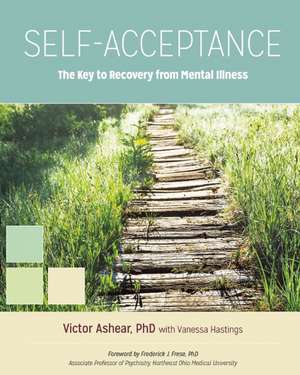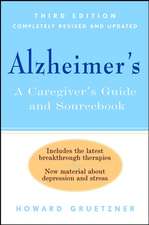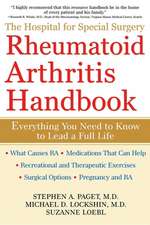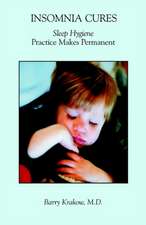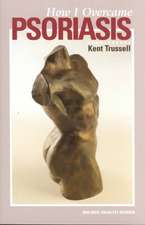Self-Acceptance: The Key to Recovery from Mental Illness
Autor Victor Ashear Vanessa Hastingsen Limba Engleză Paperback – 2 noi 2015
With the rise of the recovery movement over the past thirty years, more hope exists now than ever before for people diagnosed with serious mental illness to live full, meaningful lives. Designed for use with groups as well as individuals, this workbook provides didactic information and guides users through questions and exercises to encourage increased awareness and acceptance of the self and the effects of mental illness. By actively responding to the questions, users can better organize their thinking and engage in behaviors that will improve quality of life.
Victor Ashear, PhD has worked with patients diagnosed with serious mental illnesses for over forty years. He worked as a clinical psychologist for nearly thirty-four years at the US Department of Veterans Affairs.
Vanessa Hastings works as a technical editor/writer and marketing assistant for national firm SWCA Environmental Consultants (SWCA). Before joining SWCA, she served as the suicide prevention coordinator for her community.
Victor Ashear, PhD has worked with patients diagnosed with serious mental illnesses for over forty years. He worked as a clinical psychologist for nearly thirty-four years at the US Department of Veterans Affairs.
Vanessa Hastings works as a technical editor/writer and marketing assistant for national firm SWCA Environmental Consultants (SWCA). Before joining SWCA, she served as the suicide prevention coordinator for her community.
Preț: 136.50 lei
Nou
Puncte Express: 205
Preț estimativ în valută:
26.12€ • 27.12$ • 21.78£
26.12€ • 27.12$ • 21.78£
Carte disponibilă
Livrare economică 04-18 martie
Preluare comenzi: 021 569.72.76
Specificații
ISBN-13: 9781937612917
ISBN-10: 1937612910
Pagini: 280
Dimensiuni: 173 x 278 x 15 mm
Greutate: 0.4 kg
Editura: Central Recovery Press
ISBN-10: 1937612910
Pagini: 280
Dimensiuni: 173 x 278 x 15 mm
Greutate: 0.4 kg
Editura: Central Recovery Press
Recenzii
"I’ve often heard it said that acceptance—recognizing that you have a mental heath condition—is the first step toward overcoming it. But it’s not that simple. Self-Acceptance: The Key to Recovery from Mental Illness provides a more complete view that recognizes loss of identity and self-esteem as one of the “most significant casualties people diagnosed with mental illness experience” … In order to start a journey to recovery it is incredibly important to work “toward a more positive sense of self in the face of illness-related obstacles that threaten it. Self-Acceptance is not a textbook. It’s an easy-to-read, self-help workbook intended for people living with depression, bipolar disorder and schizophrenia. It can be useful for individuals, groups or mental health providers. It may be especially valuable for people who as a result of their illness have experienced one or more hospitalizations, unemployment or disruption in education … Exercises can be done one at a time or by section at your own pace. The workbook’s structure and questions bring personal strengths into focus and substitute positive-thinking for negative feelings. It identifies needs and coping strategies. Once exercises are completed, they help provide a personalized roadmap." By Bob Carolla - National Alliance on Mental Illness
“Victor Ashear’s workbook highlights the importance of self-acceptance in recovery from significant psychological difficulties. Drawing on his many years of clinical experience in the field, Ashear covers important topics and provides exploratory questions to assist in increasing self-awareness. It is full of useful materials both for individuals who are sufficiently stable and able to self-reflect and for mental health professionals providing group therapy."-Pamela Fuller, PhD, Author of Surviving, Existing, or Living: Phase-Specific Therapy for Severe Psychosis
"Here is a useful and field-tested resource for persons with serious mental illnesses, their loved ones, and practitioners dedicated to assisting such persons. It offers tools and practical guidance for accepting oneself as a worthwhile and contributing member of society. People cannot make progress in recovery without valuing and accepting themselves. This manual drives that point home with grace, determination, and humility."-Larry Davidson, PhD, Professor of Psychiatry Yale University, Editor, American Journal of Psychiatric Rehabilitation
“Victor Ashear’s workbook highlights the importance of self-acceptance in recovery from significant psychological difficulties. Drawing on his many years of clinical experience in the field, Ashear covers important topics and provides exploratory questions to assist in increasing self-awareness. It is full of useful materials both for individuals who are sufficiently stable and able to self-reflect and for mental health professionals providing group therapy."-Pamela Fuller, PhD, Author of Surviving, Existing, or Living: Phase-Specific Therapy for Severe Psychosis
"Here is a useful and field-tested resource for persons with serious mental illnesses, their loved ones, and practitioners dedicated to assisting such persons. It offers tools and practical guidance for accepting oneself as a worthwhile and contributing member of society. People cannot make progress in recovery without valuing and accepting themselves. This manual drives that point home with grace, determination, and humility."-Larry Davidson, PhD, Professor of Psychiatry Yale University, Editor, American Journal of Psychiatric Rehabilitation
“Victor Ashear’s workbook highlights the importance of self-acceptance in recovery from significant psychological difficulties. Drawing on his many years of clinical experience in the field, Ashear covers important topics and provides exploratory questions to assist in increasing self-awareness. It is full of useful materials both for individuals who are sufficiently stable and able to self-reflect and for mental health professionals providing group therapy."-Pamela Fuller, PhD, Author of Surviving, Existing, or Living: Phase-Specific Therapy for Severe Psychosis
"Here is a useful and field-tested resource for persons with serious mental illnesses, their loved ones, and practitioners dedicated to assisting such persons. It offers tools and practical guidance for accepting oneself as a worthwhile and contributing member of society. People cannot make progress in recovery without valuing and accepting themselves. This manual drives that point home with grace, determination, and humility."-Larry Davidson, PhD, Professor of Psychiatry Yale University, Editor, American Journal of Psychiatric Rehabilitation
“Victor Ashear’s workbook highlights the importance of self-acceptance in recovery from significant psychological difficulties. Drawing on his many years of clinical experience in the field, Ashear covers important topics and provides exploratory questions to assist in increasing self-awareness. It is full of useful materials both for individuals who are sufficiently stable and able to self-reflect and for mental health professionals providing group therapy."-Pamela Fuller, PhD, Author of Surviving, Existing, or Living: Phase-Specific Therapy for Severe Psychosis
"Here is a useful and field-tested resource for persons with serious mental illnesses, their loved ones, and practitioners dedicated to assisting such persons. It offers tools and practical guidance for accepting oneself as a worthwhile and contributing member of society. People cannot make progress in recovery without valuing and accepting themselves. This manual drives that point home with grace, determination, and humility."-Larry Davidson, PhD, Professor of Psychiatry Yale University, Editor, American Journal of Psychiatric Rehabilitation
Notă biografică
Victor Ashear, PhD has worked with patients diagnosed with serious mental illnesses for over forty years. Based on prevailing research and his own experience, he developed his approach around the central tenant that improvement in the sense of self and acceptance of mental illness diagnosis without stigmatizing oneself are essential for recovery. Dr. Ashear completed his doctorate in psychology at Claremont Graduate University and has worked as a clinical psychologist for nearly thirty-four years at the US Department of Veterans Affairs, primarily at the VA Medical Center in Sheridan Wyoming, where he focused on assisting veterans diagnosed with serious mental illness in residential, inpatient, and outpatient settings. He currently has a private practice in Sheridan.
Vanessa Hastings lives in Sheridan, Wyoming, where she works as a technical editor/writer and marketing assistant for national firm SWCA Environmental Consultants (SWCA). Before joining SWCA, she served as the suicide prevention coordinator for her community. During that time, she spearheaded and led the development of the Wyoming Chapter of the American Foundation for Suicide Prevention. In all aspects of her life, she strives to use her training and experience in suicide prevention, and her personal experience with mental illness to educate people about mental health, reduce stigma around help-seeking, and reach out to those who are struggling.
Vanessa Hastings lives in Sheridan, Wyoming, where she works as a technical editor/writer and marketing assistant for national firm SWCA Environmental Consultants (SWCA). Before joining SWCA, she served as the suicide prevention coordinator for her community. During that time, she spearheaded and led the development of the Wyoming Chapter of the American Foundation for Suicide Prevention. In all aspects of her life, she strives to use her training and experience in suicide prevention, and her personal experience with mental illness to educate people about mental health, reduce stigma around help-seeking, and reach out to those who are struggling.
Descriere
A comprehensive and groundbreaking workbook addressing the stigma and distorted self-image issues experienced by those suffering with mental illness.
